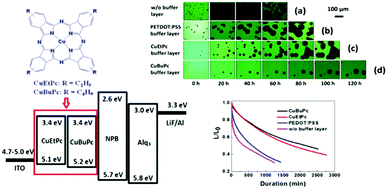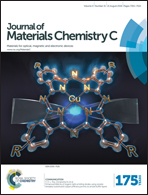Enhanced lifetime of organic light-emitting diodes using soluble tetraalkyl-substituted copper phthalocyanines as anode buffer layers†
Abstract
This study describes two soluble tetraalkyl-substituted copper phthalocyanines (CuPcs) as hole-blocking materials that can be used in the Alq3-based organic light-emitting diodes (OLEDs). The hole-blocking characteristics of these Pc layers significantly impeded hole injection into the Alq3 emitting layer and thus decreased the production of unstable cationic Alq3 species, giving an enhanced OLED efficiency and stability compared with that of devices containing the widely used PEDOT:PSS. Moreover, the insolubility of the CuPcs in water together with their extremely high thermal and chemical stabilities led to the effective protection of the ITO anode, resulting in the increased operational stability of the OLEDs in air and the enhancement of the OLED durability.


 Please wait while we load your content...
Please wait while we load your content...